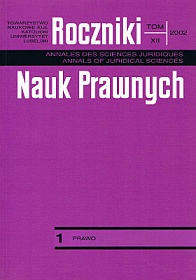The Principle of Cooperation between the State and the Church according to Primate Stefan Wyszyński
Abstract
This is the text of the lecture The Principle of Cooperation between the State and the Church according to Primate Stefan Wyszyński delivered in the Seym of the Polish Republic on 10th May 2001 during the solemn session dedicated to the Primate of the Millennium.
According to Primate Stefan Wyszyński, cooperation is the basic principle on which the relations between the state and the Church should be founded. He treated this principle as apermanent element of European culture, a culture that was rooted in Christian religious--political dualism. In practice, the principle on the universal scale has been carried out since the time of Caesar Constantine I, and in Poland since Mieszko I and Bolesław Chrobry, although the possibilities to put it in practice were different during the thousand years of Polish statehood. That principle was questioned after the Second World War, when the communist authorities set to build such as socio-political and legal order in which materialist ideology was supposed to substitute religion. Primate Wyszyński was a decided advocate of the respect for the principle of cooperation, and he took initiatives in order to use it in practice. He perceived current events with a long-term vision, and took into consideration not only the past and the present, but also the future. Thus he formed the awareness of the whole society, in particular those in power.
This model of cooperation between the state and the Church, as it is in the teaching and activity of Primate Wyszyński, has the following elements:
1) respect for partnership of the parties involved and for the clifferent tasks of the state and the Church,
2) the reason for cooperation (the common good which embraces the good of man, of family and the nation),
3) obstacles in cooperation (the ideological character of the state),
4) forms of cooperation (this cooperation should be negotiated in the form of a bilateral convention).
Copyright (c) 2002 Roczniki Nauk Prawnych

This work is licensed under a Creative Commons Attribution-NonCommercial-NoDerivatives 4.0 International License.


